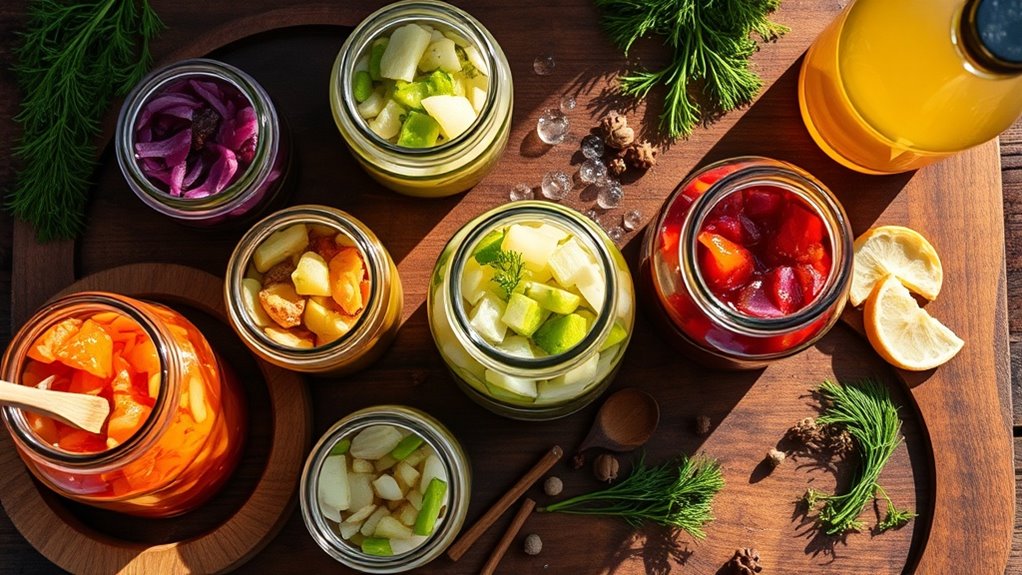The Big Myth About Gluten You Need to Stop Believing
The big myth about gluten you need to stop believing is that it’s harmful to everyone. In reality, gluten is only detrimental for people with celiac disease or specific gluten sensitivities. For most, gluten is a harmless protein that contributes to the taste and texture of many foods. Misunderstandings often arise from anecdotal claims rather than science. If you want to learn more about gluten and its effects, there’s plenty to uncover about this often-misunderstood protein.
Understanding Gluten: What It Is and Its Role in Food
Gluten, a protein found in wheat, barley, and rye, plays a significant role in the texture and structure of many foods you may regularly enjoy.
Despite common gluten myths, it’s crucial to understand that gluten isn’t inherently harmful to everyone. For the majority, it contributes to desirable qualities in baked goods, providing elasticity and chewiness that enhance your eating experience. Additionally, balanced nutrition and hydration support the body’s natural processes, allowing most individuals without gluten sensitivities to enjoy gluten-containing foods without concern.
Common Misconceptions About Gluten
Many people harbor misconceptions about gluten, often fueled by anecdotal evidence and popular diets. It’s essential to distinguish fact from fiction to make informed choices. Here’s a quick breakdown:
| Myth | Reality | Evidence |
|---|---|---|
| Gluten causes weight gain | Not inherently fattening | Weight is influenced by total diet |
| Gluten is toxic | Only harmful to celiacs | Most people tolerate gluten |
| All gluten-free foods are healthy | Some are less nutritious | Not all gluten-free options are whole foods |
| Gluten is everywhere | Found in specific grains | Not in all foods |
Understanding gluten-related conditions is vital in debunking these myths and fostering informed dietary choices.
Who Should Actually Avoid Gluten?
While there’s a lot of debate surrounding gluten, certain individuals genuinely need to steer clear of this protein.
If you have celiac disease, consuming gluten can lead to serious health issues.
Additionally, those diagnosed with non-celiac gluten sensitivity may also experience discomfort after eating gluten.
If you suspect gluten is causing issues, consult your healthcare provider for proper testing and guidance. Recent studies indicate that gluten’s role in inflammation may also affect individuals without diagnosed sensitivities.
The Science Behind Gluten Sensitivity
Understanding gluten sensitivity requires delving into the complex interactions between gluten and your body’s immune response. While some individuals experience genuine discomfort after gluten consumption, it’s crucial to differentiate between true gluten sensitivity and other conditions.
| Symptom | Possible Trigger | Research Status |
|---|---|---|
| Bloating | Gluten or FODMAPs | Needs Further Study |
| Fatigue | Inflammation | Evidence Lacking |
| Headaches | Diet Variability | Limited Evidence |
| Brain Fog | Stress and Diet | Hypothesis Only |
Gluten and Celiac Disease: The Facts
Celiac disease is a serious autoimmune disorder triggered by the ingestion of gluten, a protein found in wheat, barley, and rye.
When you consume gluten, your immune system mistakenly attacks the lining of your small intestine, leading to malabsorption and various symptoms.
If you suspect celiac disease, getting tested and diagnosed by a healthcare professional is crucial for managing this condition effectively. Understanding distinctions between gluten sensitivity and celiac disease can help in recognizing symptoms and appropriate management.
Healthy Alternatives: What to Eat If You Avoid Gluten
Are you wondering what to eat if you’re avoiding gluten?
Focus on naturally gluten-free foods like fruits, vegetables, lean meats, fish, and dairy. Whole grains such as quinoa, brown rice, and buckwheat are excellent choices too. Incorporating fermented foods can also enhance your gut health while keeping your diet gluten-free.
Always read labels for processed foods to ensure they’re gluten-free. With a bit of planning, you can enjoy a diverse and nutritious diet without gluten.



